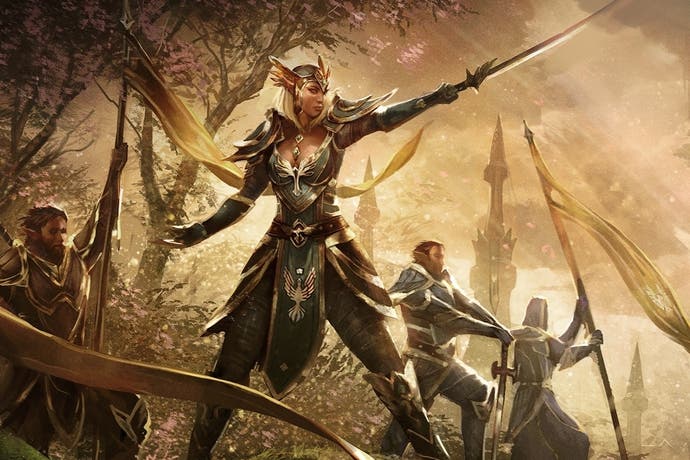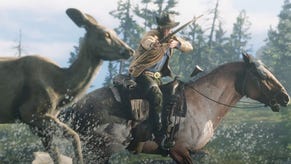The Elder Scrolls Online review
Tamriel life.
You can see how making a massively multiplayer version of a popular single-player role-playing game would look like a no-brainer to a publishing executive. The gameplay will be broadly portable and, if your game series is as long-running and voluble as Bethesda's The Elder Scrolls, the world and the lore have already been mapped and written.
The reality is very different, as EA discovered to its incalculable cost with BioWare's Star Wars: The Old Republic. The single-player storytelling style your audience has come to expect clashes both practically and philosophically with an environment teeming with other players, creating a buzz of dissonance that refuses to go away. Too much effort is expended on things that don't play to the strengths of an MMO, like all-star voice acting casts and plot-heavy quest lines that can't be shared, and the sheer quantity of content needed starts to erode quality. (It's telling that the world's most popular MMORPG is based, not on an RPG at all, but a strategy game, Warcraft: a world of hundreds of tiny warriors scurrying about, little cogs in a grand plan, participators but not protagonists.)
The Elder Scrolls Online suffers from all of these problems and the result is a tepid and dull interpretation of Bethesda's straight-faced fantasy universe, stretched so thin you can see right through it to the cold machine running underneath. It's a shame, because ZeniMax Online Studios, the team put together in 2007 by Bethesda's parent company to make this game, has got a lot of the MMO basics right, if not all. ESO boasts a superb character-building system, impressive networking tech (when it works), solid combat, fun dungeons and player-versus-player warfare, and it at least appears to have plenty of endgame content to keep players hooked and paying its mandatory subscription fee.
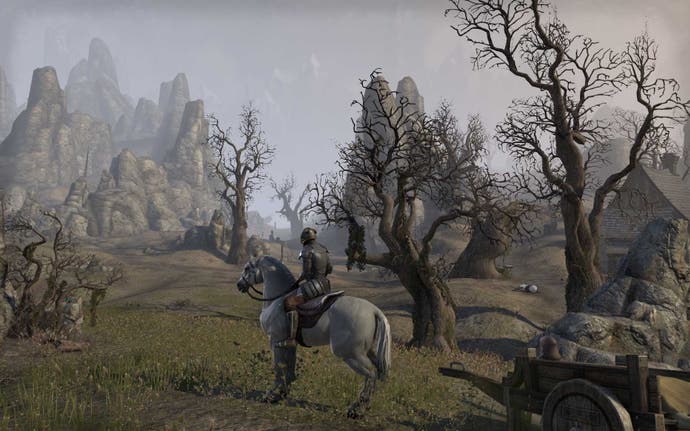
In an MMO, story emerges from the narrative patchwork of the world and the player's sense of place in it - and this is the first and perhaps most important thing that ZeniMax Online has missed. When creating your character - trying and failing to use the range of customisation options to avoid a look of stoic blandness - you pick from nine races and three warring factions. Yet when the game begins, irrespective of your choice, you're an amnesiac imprisoned in the chilly purgatory plane of Coldharbour. This is the start of the game's main storyline, which you will return to regularly as you level up. A spectral prophet appears and tells you you're special, that only you can escape this hell and save the world. It's a lie, of course: there are thousands of your kind running around. It's half an hour before you arrive in your supposed homeland as a visitor, rootless and estranged, with no sense of belonging. It's a textbook start for a single-player RPG and a terrible one for an MMO, where belonging is everything.
More fundamental mistakes have been made in how the game is built. Ever since its announcement, there have been complaints that the game wouldn't replicate the free-form structure of Elder Scrolls tradition, where players explore the world and the storylines in the manner and order of their choosing. This is true, and largely inevitable for an MMO I think; the bigger disappointment is that it needn't have been arranged anything like as rigidly as it has.
Each faction has its own hermetically sealed adventuring campaign, and each campaign is a strictly linear journey with no racial variations and no choice as to which region you visit next. (The three factions only meet and fight in the central region of Cyrodiil to join the Alliance War.) It's prescriptive for the player, killing any sense of being master of your own destiny, and it's an inefficient expenditure of effort for the developers, since a large proportion of players will only see a third of their work. (Players who reach the level cap are able to sample the other two campaigns - another flawed decision I'll come to later.)
I've played a fair way into two of these campaigns and there's little to choose between them, and little within them to distinguish one region from the next. ZeniMax Online's artists and writers have really struggled to inject personality and variation into this world. Memorable characters and locations are few and far between. Cities are interchangeable arrangements of repeating, oversized architecture. Landscapes are an unchanging wash of rugged greens and browns. It's not an ugly game, far from it - it has a nice line in pastoral melancholy - but its look never changes and your visual palate is never refreshed. That's extremely wearying over the course of 50 hours, never mind the hundreds people play MMOs for.
Quests try, with varying success, to avoid the fetch-and-carry factory grind of MMO tradition, but end up replacing it with something worse; a flabby, lifeless, repetitious wordiness. There's an excess of careless, anachronistic dialogue; of credibility-stretching high-fantasy gobbledegook clashing with low-fantasy Agatha Christie intrigue; of lazy storytelling get-out clauses (ghosts! portals!). Quests end with seemingly divisive choices and then hand you your reward regardless and send you on your way with no sense of consequence. There's a huge preponderance of time travel and ghostly re-enactments of past events, as if the most interesting events in this world already happened a long time ago. It certainly feels like it. As a questing game, The Elder Scrolls Online is plain boring.
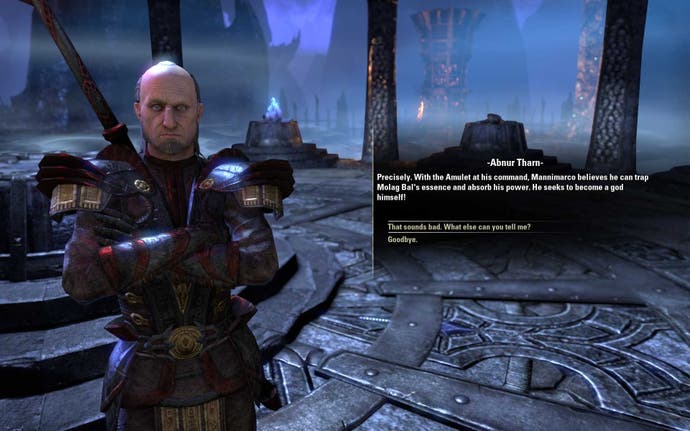
Fortunately, although you might be forgiven for thinking otherwise, that's not all there is to it. You'll find free-standing multiplayer content scattered around the maps, all awarding generous dollops of experience: boss monsters, public mini-dungeons called Delves, and cycling public events called Dolmens, where players battle waves of monsters. These aren't an unqualified success: Dolmens never vary and Delves are blighted by knots of players (or bots) standing around the bosses' spawn locations, killing them in seconds. They clearly don't belong in the same league as Guild Wars 2's cleverly integrated and balanced open-world mutiplayer content. But they are still a welcome change of pace and it's never hard to find other players to fight alongside.
This is thanks to ZeniMax Online's megaserver technology, which doesn't corral players into separate realms or shards, but allows everyone in Europe or North America to play together and assigns map populations dynamically. It's a pretty seamless solution, if not perfect - you often can't help a friend complete a quest you've already done, for example - and it has two massive advantages. One: you will always be able to find and play with friends, without worrying about creating a new character or transferring an existing one to a new server. Two: the game will presumably always feel lively and populated with players, even if numbers dip, and it should always be easy to find a group for dungeons or PVP.
Dungeons, as opposed to Delves, are private to a group of players (four in the early stages, with 12-mans becoming available at the level cap). They're in the standard MMO tradition of bosses and mini-bosses interspersed with large packs of "trash", and though clichéd in style and setting they're well tuned and great fun to play; a little messy in the teens, when players don't necessarily have the right group tools at their disposal yet, but coming into their own from level 20.
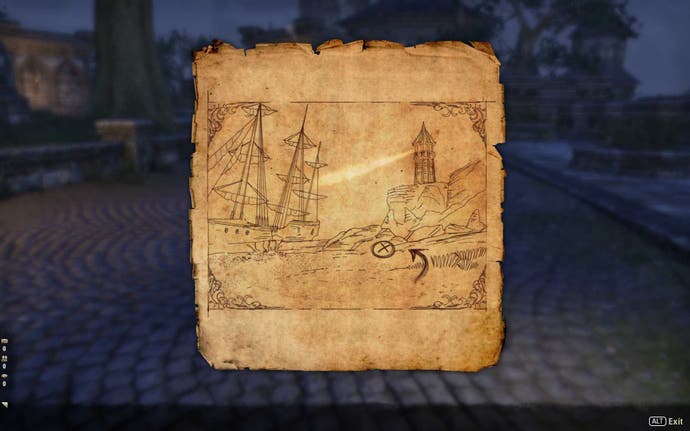
PVP comes only in the form of the three-way Alliance War on the vast map of Cyrodiil. Available from level 10, this is a compellingly large-scale (and surprisingly stable) mode in which you join other members of your faction in massed sieges to control defensive structures, travel routes and resource nodes, as well as raids to steal and defend the Elder Scrolls themselves, which confer faction-wide buffs. There's PVE content scattered around the map, too.
Once again, ZeniMax Online gives something away to its rival ArenaNet; Guild Wars 2's similar "world-versus-world" mode is more tightly structured and felt more finished at launch. But Alliance War is still an impressive take on mass PVP with abundant promise, as you would expect from a studio headed by Matt Firor, the leading light of Dark Age of Camelot, still regarded as the classic of this genre. Although it's best suited to PVP-minded guilds and comes into its own at the level cap, it still has an epic thrill for a lower-level solo player or a small group, and most of its issues are fixable. One relatively easy fix would be to beef up the experience rewards, which would make it feel like a more viable levelling alternative to the game's tedious questing; another might be to shorten the 90-day campaigns, which feel too long to invest in personally.
The Elder Scrolls Online often feels compromised as both an MMORPG and as an Elder Scrolls game, but there's one respect in which it finds a beautiful balance between the two. This is its role-playing system, where four broad character classes are merely the starting point. Each class has three specialisations, but armour and weapon specialisations are completely separate from these and bring their own active and passive skills, as do your race and your guild alignments. You can even get access to new lines by becoming a vampire or werewolf, as per Elder Scrolls tradition. Skill trees level independently of your character and skill points are awarded as quest rewards and for exploring and finding Skyshards as well as for levelling up. From all of this, you need to pick just six active skills to use, although you can swap between two skill-and-weapon sets from level 15.
With just the right balance of freedom and restriction, and all the necessary tools for organised group play (such as heals and taunts) available from multiple sources, ESO finds a fine equipoise between the defined design required by a multiplayer RPG and a genuine sense of freedom as to how you build your character. Optimised builds will certainly emerge, but pinning them down will be a fascinating challenge for even the most cerebral of theorycrafting wonks, while everyone else will find it's possible to tinker without ruining your character.
How these builds play in action is a less elegant but still successful compromise. With no auto-attack and no fixed targeting, combat is a bit more free-flowing and fast-moving than your regular hotbar-dominated MMO. Though pace is still dictated by your skills and the resources spent to use them, you also have light and heavy weapon attacks and crucial blocks and interrupts available at no cost, and constantly need to use positioning and an evade move to dodge enemies' area-of-effect attacks. It works well and preserves the Elder Scrolls feel - although in an odd reversal of form, melee feels like a more satisfying and powerful play style than ranged, and stealth isn't much use. PVP turns this on its head again, as ranged players' targeting accuracy lends them an advantage and melee, thanks to players' ability to clip through each other, turns into a messy, soupy scrum.
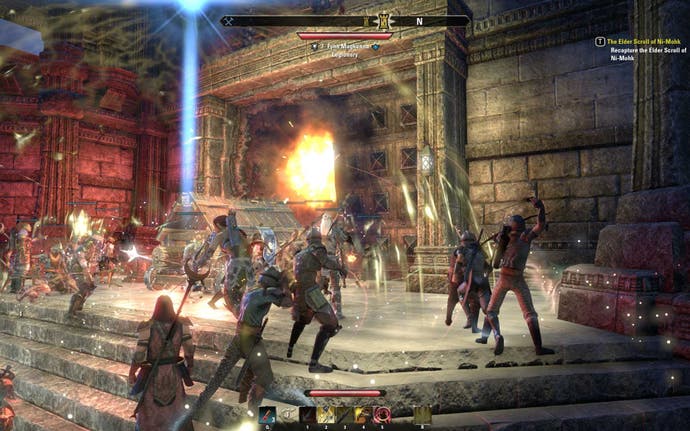
With some big merits, some big demerits and quite a lot of compromise and competent mediocrity between them, the scales are finely balanced for The Elder Scrolls Online as it approaches crunch time: the endgame, and the attendant question of whether it's worth paying a subscription for. I haven't reached level 50 myself, but from players' reports and ZeniMax Online's currently announced plans, it's clear that the developer knows it needs to make a strong case.
Elder Scrolls fans will be put off by the rigid structure and weak storytelling, while your average MMO player will tire of wading through the wan questing to get to the good stuff
There's a Veteran levelling system which allows players to keep on acquiring skill points past the level cap. Alliance War is a big feather in the game's cap for high-level players, and although there's currently a shortage of testing Veteran-level PVE content, the impressive-sounding Craglorn update looks set to fix this soon. On the downside, the lack of a trading game weakens ESO's social glue considerably, and the decision to make the rival factions' campaigns available in Veteran versions once you hit level 50 is misguided. It provides an enormous amount of extra content, but it's the game's weakest and most boring content - solo quests - and it leaves the game's narrative logic in tatters. It also conflicts directly with the impulse to roll a new character in a different faction and, in doing so, to explore the game's best content - its skill trees.
Although The Elder Scrolls Online will be appealing to some hardcore guilds, especially those with an interest in large-scale PVP, it's hard to see it keeping casual and semi-casual players on the books - and it's those players who propel these blockbuster MMOs into profitability. Elder Scrolls fans will be put off by its rigid structure and weak storytelling, while your average MMO player will tire of wading through the wan questing to get to the good stuff. Even the good stuff isn't outstanding, and the game doesn't represent good value compared to its competition. Guild Wars 2 has, in most respects, far superior multiplayer dynamics and doesn't require a subscription. World of Warcraft, though definitely now showing its age, is an unbeatably complete package set in a much more vivid and enticing world.
It's tempting to write off subscription MMOs completely, but there are some signs of life in the sector: Final Fantasy 14 is doing quite well, and the forthcoming WildStar is in the final stages of a persuasive charm offensive with the MMO community. But there are only fleeting signs of life in The Elder Scrolls Online itself - and few of them have anything to do with The Elder Scrolls. Maybe this grand project sounded like a good idea in 2007, but now it feels like a leftover obligation: a game no-one really asked for, and a flawed premise from the start.
